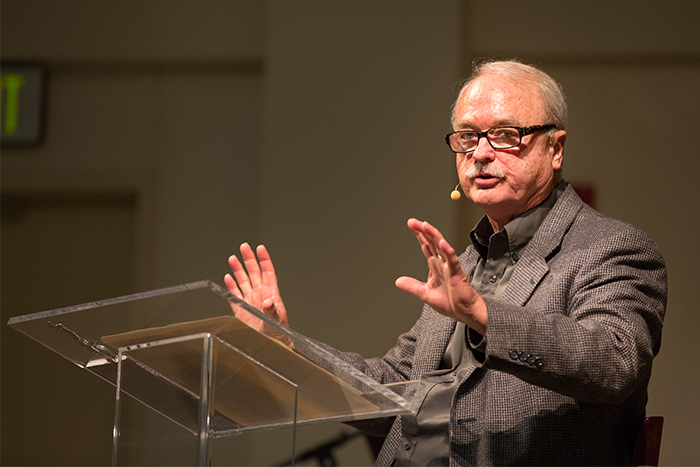Stand Firm conference equips believers to use apologetics as ministry

Though people leave the church—and Christianity as a whole—for a variety of reasons, J.P. Moreland, distinguished professor of philosophy at Talbot School of Theology, said two reasons are of particular significance. First, people feel as though they cannot ask questions, which leads them to believe there are not any answers; and second, when they ask questions, they are either dismissed or given inadequate answers, which again leads them to believe that Christianity has no answers.
“The main problem here is that the church has lost the value of reason and the importance of apologetics in the life of the church,” Moreland explained. “That’s why we’re losing, and that’s why we will lose this war in America.”
Moreland served as the keynote speaker at Southwestern Seminary’s “Stand Firm” Apologetics Conference, April 15-16. Speaking on the need of, nature of, and basis for apologetics, Moreland began by defining the term.
“Apologetics is the ministry of caring for people by answering their objections to Christianity and giving them reasons for Christianity,” he said. “Unbelievers sometimes have questions, and apologetics is an attempt to help them. That’s all.”
Contrary to popular belief, Moreland said apologetics is not about “getting into highbrow academic discussions and arguments with people.” Instead, it is a matter of learning why Christians believe what they do and offering that to people as a form of help. That is, allowing people to ask questions and then sharing with them the answers.
Some of these questions were answered in the conference’s breakout sessions, most of which were led by Southwestern faculty. One session, for example, explored the question of whether science disproves miracles. Assistant Professor of Philosophy and Humanities Keith Loftin answered this question by first pointing out that miracles, despite how they are often defined, are not violations of the laws of nature.
“The laws of nature tell us what will happen naturally unless there is some intervening force,” Loftin explained. “If my laptop falls off my desk and I catch it, I haven’t broken the law of gravity. The law of gravity has a perfectly good explanation for why the computer didn’t hit the ground, and that is: an outside force intervened. This is how we should be thinking about miracles.
“The so-called ‘laws’ of nature are just our best descriptions of how the natural world behaves in the absence of interventions. But, of course, a miracle is an intervention by God.”
Loftin defined miracles as “events that are performed supernaturally beyond the ability of the natural order.” He thus concluded that, in this sense, science does not disprove miracles.
During another of his plenary sessions, Moreland addressed one of the major arguments against Christianity—namely, that it is not a valid source of knowledge. This notion, he said, stems from the rise of two dominant worldviews in America: scientific naturalism and postmodern relativism. Both of these views assert that “true” knowledge can only be learned from hard sciences. Moreland argued, however, that Christianity is, indeed, a source of knowledge.
“When I claim that Christianity is a source of knowledge,” he said, “I mean three things. First, it provides us with direct experiences of God and the unseen world [knowledge by acquaintance]. Second, it gives us true beliefs about God that are based on good, solid reasons, even if the reasons aren’t 100 percent certain [propositional knowledge]. And third, it gives us skill and ability to do things well through its teachings [on such matters as prayer and parenting].”
Additional topics covered through both plenary and breakout sessions included how to defeat arguments for atheism, moving from monotheism to Christianity, and tactics for non-confrontational engagement. Resources were also available regarding Southwestern’s programs in this area, such as the 45-hour Master of Arts in Christian Apologetics.
Travis Dickinson, associate professor of philosophy and Christian apologetics, clarified that the training in apologetics and philosophical thought offered by this two-day conference and Southwestern’s programs is ultimately for the purpose of reaching people with the Gospel and training up the church. “That’s what we’re about this weekend,” Dickinson said, “and that’s what we’re about at Southwestern.”
Next year’s Stand Firm conference is tentatively scheduled for March 31-April 1, 2017. Timothy McGrew, professor of philosophy at Western Michigan University, will be one of the keynote speakers. For more information, visit swbts.edu/standfirm.



